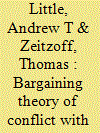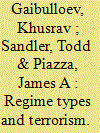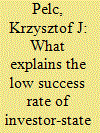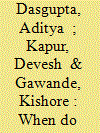|
|
|
Sort Order |
|
|
|
Items / Page
|
|
|
|
|
|
|
| Srl | Item |
| 1 |
ID:
154543


|
|
|
|
|
| Summary/Abstract |
Bargaining models play a central role in international relations, particularly in the study of conflict. A common criticism of this approach is that it fails to account for nonmaterial (e.g., psychological) factors that may influence the bargaining process. We augment a standard bargaining model by allowing actors’ preferences over conflict to diverge from the “fitness” payoffs (e.g., resources) typical of such models. Preferences are subject to evolutionary forces—those who attain high fitness reproduce more. We find that (1) there is a trade-off where being “irrationally” tough leads to better bargains but also more inefficient conflict; (2) actors develop behavioral biases consistent with empirical findings from psychology and behavioral economics; and (3) these behavioral biases inevitably lead to conflict. By bridging the strategic and psychological approaches to conflict, our models provide new insights into questions such as how changes in military and intelligence-gathering technology affect the likelihood and expected cost of war, and how to interpret the purported decline of violence over recent human history.
|
|
|
|
|
|
|
|
|
|
|
|
|
|
|
|
| 2 |
ID:
154541


|
|
|
|
|
| Summary/Abstract |
That the anarchic system generates incentives for states to balance each other's power is conventional wisdom in international relations. As such, the contemporary unipolar system is an anomaly. Observers explain its existence in several ways, including the benevolence of US hegemony and the constraints international institutions impose on the exercise of US power. None of them, however, explain what is perhaps the most puzzling outcome of the Soviet collapse: the decision of the United States to maintain its level of military spending. To explain its choice, we extend the seminal argument Waltz advanced long ago to a dynamic setting. Using a simple model, we show that the interest of the unipole in deterring a challenge to its power can induce it to continue to invest in guns rather than to shift its resources to the production of butter. This strategy can enable the incumbent unipole to pre-empt the balancing process that has long been thought to be central to state survival under anarchy.
|
|
|
|
|
|
|
|
|
|
|
|
|
|
|
|
| 3 |
ID:
154545


|
|
|
|
|
| Summary/Abstract |
Self-determination claims have abounded in the international system since the end of World War II. But these claims have not emerged everywhere. About half of the states in the international system face some challenge related to self-determination today. Why do some states face these demands while others do not? We argue that ethno-national self-determination is one of many identities with which individuals can find affinity. While an international norm related to self-determination has developed globally, its use as a basis for political claims has diffused regionally. Diffusion of self-determination occurs through observation of others using self-determination as a basis of organization, generating a sense of legitimacy, sensitivity to related grievance, and perceptions of tangible benefits related to self-determination identification. We test this empirically on global data on self-determination claims from 1960 to 2005 and find evidence of spatial diffusion, suggesting that self-determination is, to some extent, contagious.
|
|
|
|
|
|
|
|
|
|
|
|
|
|
|
|
| 4 |
ID:
154542


|
|
|
|
|
| Summary/Abstract |
Regime type has opposing effects on terrorism. If a regime constrains the executive branch, then terrorism may be more prevalent. If, however, a regime allows all viewpoints to be represented, then grievances may be held in check, resulting in less terrorism. Regimes that value constituents’ lives and property will also act to limit attacks. We formulate a game-theoretic model, containing a terrorist group and targeted government, that captures these opposing forces and supports a nonlinear relationship between regime type and terrorism. This model indicates how diverse samples in the literature can result in different relationships between regime type and terrorism. Seldom does it support the positive relationship that is prevalent in the terrorism literature. We apply a large variety of empirical techniques to show that regime type has a robust inverted U-shaped impact on various terrorism measures. Foreign policy variables (e.g., alliance with the United States) are not a robust influence on terrorism.
|
|
|
|
|
|
|
|
|
|
|
|
|
|
|
|
| 5 |
ID:
154544


|
|
|
|
|
| Summary/Abstract |
The treatment of foreign investment has become the most controversial issue in global governance. At the center of the controversy lies the mechanism of investor-state dispute settlement (ISDS), which allows private firms legal recourse against governments if government interference has degraded their investment. Using newly released data covering 742 investment disputes, I assess some of the central claims about ISDS. I argue that the regime has indeed undergone an important shift: a majority of claims today deal not with direct takings by low-rule-of-law countries, but with regulation in democratic states. Such “indirect expropriation” claims have seen a precipitous decrease in their odds of legal success over the past twenty years. They are also far less likely to result in early settlement. These parallel trends may be a result of a rise in strategic litigation by investors whose aim is not only to obtain compensation but also to deter governments' regulatory ambitions.
|
|
|
|
|
|
|
|
|
|
|
|
|
|
|
|
| 6 |
ID:
154546


|
|
|
|
|
| Summary/Abstract |
Theory and extensive evidence connect poverty and underdevelopment to civil conflict yet evidence on the impact of development programs on violence is surprisingly mixed. To break this impasse, we exploit a within-country policy experiment to examine the conditions under which antipoverty programs reduce violence. The roll-out of India's National Rural Employment Guarantee Scheme caused a large long-run reduction in Maoist conflict violence, as measured with an original data set based on local-language press sources. These pacifying effects were not uniform, however, but overwhelmingly concentrated in districts with sufficient pre-existing local state capacity to implement the program effectively. The results demonstrate the potential for anti-poverty programs to mitigate violent civil conflict by improving livelihoods, but also highlight the crucial role of state capacity in shaping these effects.
|
|
|
|
|
|
|
|
|
|
|
|
|
|
|
|
| 7 |
ID:
154540


|
|
|
|
|
| Summary/Abstract |
International trade directly influences US presidential elections. We explore the electoral implications of the increasing tradability of services and the large US surplus in services trade. Our paper builds on prior work showing that job insecurity from import competition in manufacturing diminishes political support for incumbents. We construct novel measures of the tradability of an industry using establishment-level data covering nearly all US economic activity. We find increases in incumbent party vote shares in counties with large numbers of workers in high-skilled tradable services as well as goods, and decreases in counties with high employment in low-skilled manufacturing. Incumbent parties are particularly vulnerable to losing votes in swing states with many low-skilled manufacturing workers. In national-level models, we show for the first time that increasing imports (exports) are associated with decreasing (increasing) presidential incumbent vote shares. The national-level effects are large and politically consequential. We also find an Electoral College incentive to protect the manufacturing sector and to oppose trade agreements.
|
|
|
|
|
|
|
|
|
|
|
|
|
|
|
|
|
|
|
|
|